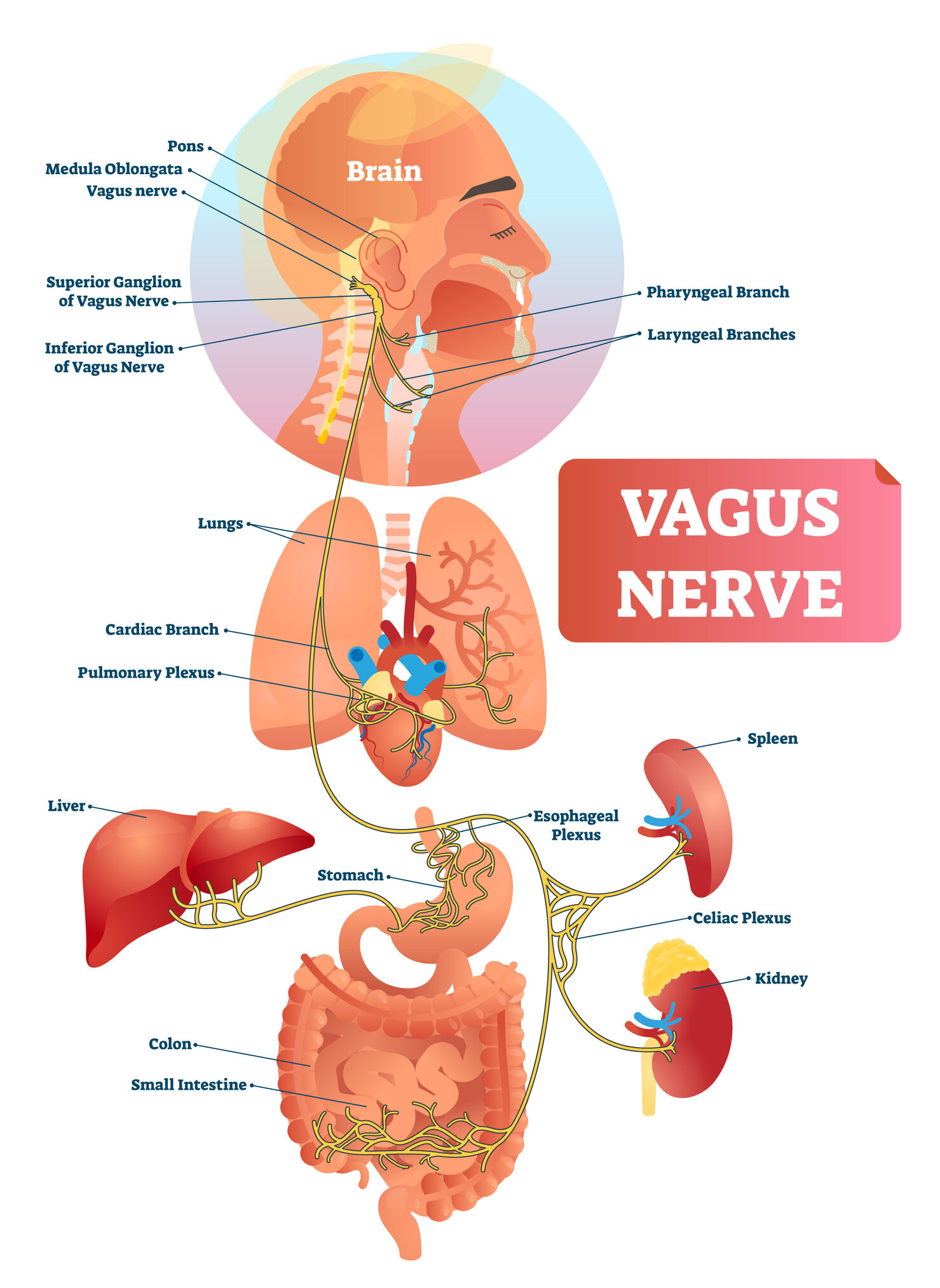Why You Should Pay Attention to your Vagus Nerve in 2020
Having a well-functioning and healthy vagus nerve is now believed to be essential for good overall health, but a poorly functioning vagus nerve is linked to poor health and chronic disease.
Here’s how the vagus nerve has a powerful effect on our physical and mental health and why improving its tone with stimulation techniques can improve our overall health.

What is the Vagus Nerve?
The vagus nerve is the longest nerve in the human body. It’s a cranial nerve, meaning that it extends from the brain stem, and reaches all the way down to the gut, branching out through the chest and abdomen reaching the heart and many of the major organs. So it’s no surprise to learn that the word ‘vagus’ means wandering in Latin.
The vagus nerve sends both sensory and motor information to and from the gut. Its sensory functions are two-fold – somatic and visceral. Somatic sensory functions include providing physical sensations to the skin including the ear canal and the throat, and its visceral sensory functions include providing physical sensations to the majority of the digestive tract. It also plays a role in the taste sensations we receive from the base of the tongue.
Motor functions of the vagus nerve include stimulating the muscles of the mouth and soft palate and the involuntary pulsing movements of the gut which allow food to pass from the mouth, down the oesophagus and through the intestines.
The vagus nerve, therefore, forms a major part of the complex brain-gut axis but it also forms the main part of the parasympathetic nervous system, which is responsible for many biological functions. As well as sending and receiving messages to and from the gut, it also stimulates the muscles of the heart, helping to lower the resting heart rate and has a role in regulating mood and immune response.
For this reason, the vagus nerve is the subject of much research into the treatment of gastrointestinal and mental health conditions. Most notable of which is vagus nerve stimulation.

Why is the Vagus Nerve Important to Health?
The vagus nerve is so important to our health because it helps to regulate inflammation. Short term inflammation is essentially a good thing. It’s the body’s normal response to fighting an invading pathogen or healing an injury.
But when inflammation becomes long term, or chronic, it can lead to chronic inflammatory diseases such as heart disease, strokes, type 2 diabetes, obesity, rheumatoid arthritis, dementia and gut disorders such as Crohn’s disease.
Since the vagus nerve is the main nerve of the parasympathetic, or rest and digest, nervous system, it has an important role in slowing down our heart rate and breathing. It also helps us to relax, digest our food properly and make us feel calm and at peace.
A poorly functioning vagus nerve, or having ‘reduced vagal tone’, is associated with the release of stress hormones such as pro-inflammatory cytokines, and a reduction in the release of the neurotransmitter acetylcholine which stimulates restful REM sleep and keeps inflammatory markers in check. This can then lead to chronic, low-level inflammation and its associated diseases.
So looking after the health of our vagus nerve in turn helps to keep stress and inflammation levels low, and can reduce our risk of developing chronic disease.
RECOGNISING REDUCED VAGAL TONE AND THE IMPORTANCE OF VAGUS NERVE STIMULATION
If you regularly suffer digestive complaints such as nausea, vomiting, diarrhoea, constipation, acid reflux and abdominal pain, or you experience regular headaches, joint pain, anxiety, low mood, fatigue, dizzy spells or insomnia, you may have reduced vagal tone.
Vagal nerve stimulation can help to improve vagus nerve tone and function. Stimulating your vagus nerve can be achieved by regularly performing yoga, meditation and deep breathing techniques and making changes to your diet. We have more in-depth tips in our next article on Vagus Nerve Stimulation.
Will you be paying attention to your vagus nerve this year?







